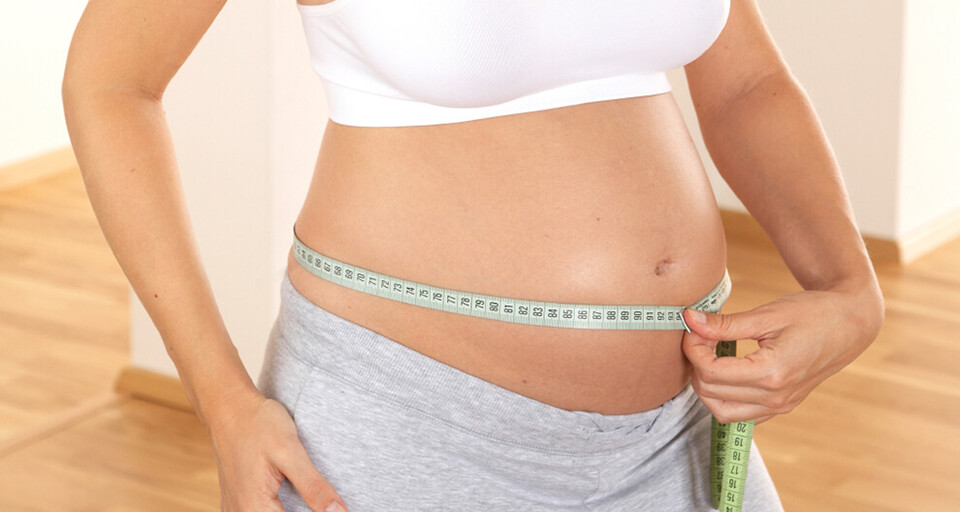Weight gain during pregnancy
Most pregnant women are worried about their weight during pregnancy. You might also ask themselves whether you are gaining too much or too little weight. At the same time, you might worry if your belly isn't growing as much as you feel it should. Generally, you should remember that weight gain during pregnancy is highly individual. Also, pregnancy is not the time to be worrying about your weight. After all, you have a baby growing inside you right now! Read on and learn more about your weight gain during pregnancy, so you can stop worrying and enjoy this wonderful time instead.
Source: According to Weight Gain During Pregnancy: Reexamining the Guidelines. Institute of Medicine (US) and National Research Council (US), 2009
Determination of weight gain looking at the BMI
To find out approximately how much weight you should gain during pregnancy, your midwife or gynaecologist will determine your personal body mass index, or BMI for short. Your BMI is calculated as your weight divided by the square of your height.
Weight in kg : (height in m)2 = BMI kg/m2
Here’s an example for a woman who is 1.65 m tall and weighed 65 kg before pregnancy: BMI = 65 kg : (1.65 m)2 = 23.9 kg/m2
The normal BMI for women of childbearing age is between 18 kg/m2 and 25 kg/m2. Those with a BMI below 18 kg/m2 are considered underweight and those above 25 kg/m2 are considered overweight. Women with a BMI of 30 kg/m2 and above are considered obese. We do want to stress, though, that a person’s BMI is only of limited significance. Because of the different density of muscles and fat, very sporty women, for example, can be considered overweight based on their BMI, even though they have little body fat. Age is another important factor that needs to be considered when it comes to the BMI.
Despite it all, the BMI is used as a guide in obstetrics to evaluate whether weight gain during pregnancy is within a healthy range or not. Based on the BMI, the following ranges are considered unproblematic for weight gain during pregnancy:
Average weight gain during pregnancy – a week-by-week overview
Depending on which trimester you are in, the amount of weight you are going to gain will vary week by week. While you might see little difference on the scale at the beginning of your pregnancy, this can change quickly during the second trimester. Your baby will grow and put on weight, your blood volume will increase and your body will retain water and build up fat reserves to prepare for breastfeeding.
Most women will gain almost no weight in their first trimester, while their weight seems to relentlessly go up in their second and third trimester. And that’s exactly how it should be!
It is also normal to have a sudden jump in weight from one week to the next when you are pregnant. Whenever your baby has a growth spurt, your weight gain might not be as slow and steady as it normally is. This is where the HiPP weight gain graph comes in handy: As long as you stay within the recommended range (grey area in the chart), there’s usually little to worry about.
You can also have a look at our weight gain table to get an idea of what to expect when it comes to weight gain during pregnancy:
Particularly in the case of pregnant women who are overweight or underweight or have pre-existing conditions, midwives and gynaecologists also like to look at their weekly weight gain. They use these benchmark values for orientation:
- until week 13: almost no weight gain
- week 14-24: 250-300 grams per week
- after week 25: 400 grams per week
Weight gain when expecting twins or more
The average weight gain ranges apply primarily to single pregnancies. The benchmarks for women expecting multiples are, of course, higher. This is because there are more babies growing in mummy’s belly, and because these babies need more blood, more amniotic fluid, more placental tissue, etc. to thrive.
So if you are expecting twins, gaining about 15.5 to 20 kilograms is quite normal. If you are pregnant with triplets, gynaecologists and midwives estimate about 20.5-23 kilograms of weight gain.
Too little or no weight gain during pregnancy
If the expectant mother is underweight at the beginning of her pregnancy, she is particularly encouraged to gain weight. This is because being underweight is associated with a risk of spontaneous preterm delivery as the body is not able to sustain the pregnancy to full term without harming itself. Additionally, being underweight can lead to nutritional deficiencies that can be detrimental to the baby’s health and even cause serious harm. Underweight mothers are also a lot more likely to deliver babies with a very low birth weight.
If the weight remains the same throughout the pregnancy or if there is only a small increase in weight, there can be several underlying causes. Especially women who struggle with severe morning sickness in early pregnancy also have a reduced appetite. Together, this can lead to a slow weight gain. Women affected by hyperemesis gravidarum (HG) often even lose weight in the first weeks of pregnancy due to the vomiting. Women with persisting HG can have difficulties gaining enough weight.
If the weight stagnates for several weeks during pregnancy, this can be a serious sign of foetal growth restriction (FGR) and an indication of malnutrition. Should this be the case, please consult your gynaecologist or midwife as soon as possible to rule out any health issues for you and your baby.
Too fast or too much weight gain during pregnancy
If the expectant mother is very overweight or obese, there is an increased risk of gestational diabetes mellitus (GDM – type 4 diabetes). If mummy overeats, her baby is at risk of becoming diabetic too. Pregnant women who are very overweight or obese and eat a sugary and fatty diet often give birth to very large and heavy babies. This is called macrosomia.
If the maternal weight increases very quickly, this is often a sign of a poor diet. This means, for example, that they eat too many meals per day or tend to eat foods that are very sugary or fatty. However, if this is the case with you, we advise against trying to lose weight just now. You should rather try to switch to a healthier diet. Following these tips can help you regulate your weight gain in a healthy way:
- Eat only when you are really hungry.
- Eat at least three servings of vegetables and two servings of fruits per day. One serving is more or less the amount that you could fit in your hand.
- Save any snacks and sweets for special moments and enjoy sugary and fatty foods only in moderation.
- Also make sure to include plenty of exercise in everyday life.
Very rapid weight gain of one kilo or more per week over several weeks can be an indication of water retention (oedema). Severe water retention can in some cases be a warning sign of pre-eclampsia or gestational diabetes. Make sure to talk to your midwife or gynaecologist about it.
FAQs on pregnancy weight
We have summarised the most important things you need to know about weight gain during pregnancy.
How much weight is ok to gain during pregnancy?
The answer to this question depends on your starting point (pre-pregnancy weight) and can vary between 5 and 18 kilograms. If you fall within the normal weight range, you may gain an average of 11 to 16 kilograms. Overweight women should not gain more than 5 to 9 kilograms. However, having a balanced diet that provides you and the baby with all the important nutrients you two need is much more important than the number on your scale. For example, if you suffer from morning sickness, you might even lose weight in early pregnancy. As long as you and your baby are doing well and you are getting enough nutrients, gaining some weight is no problem, especially not in the first trimester.
How much weight from fluids is normal during pregnancy?
Fluid building up in the body’s tissues – also called oedema – is completely normal during pregnancy and is nothing to worry about. Experts believe that the amount of water in the body increases by up to 35 percent during pregnancy. This is because blood formation is boosted and amniotic fluid is produced. Additionally, the skin tissue becomes softer during pregnancy, making it more susceptible to water retention. Especially in summer, many pregnant women suffer from oedema. Water retention can make up 2 to 2.5 kilograms of their pregnancy weight. Light exercise, like pregnancy yoga or walks, can help counter water retention. Severe cases of water retention can also be an early sign of pre-eclampsia. If in doubt, we recommend consulting your gynaecologist.
Should I eat for two while pregnant?
Popular wisdom advises pregnant women to eat a lot, after all they are “eating for two”. However, this has been scientifically debunked. In fact, a pregnant woman only needs to up her caloric intake by 250 kcal in the second trimester and by 500 kcal in the third trimester compared to before pregnancy. The amount of calories is secondary to the amount of nutrients a meal for pregnant women should contain, though.
How much weight should I have gained by week 20 of my pregnancy?
At the end of week 20 you are just under halfway through your pregnancy. By this time, your baby will only weigh about 250 to 290 grams, which means that you will probably not have gained a lot of weight yet. After month 5 of your pregnancy, you should have gained about 2 to 3 kilograms. This number, however, strongly depends on your individual constitution, meaning for example your pre-pregnancy weight or the severity of your morning sickness.
Celsy Dehnert is a freelance journalist and advice columnist. As a mother of two toddlers who are 18 months apart, she was often faced with the question of what actually matters in pregnancy. Today, she answers the most pressing questions of expectant parents.
Expert advice and editing: Birgit Laue, midwife & medical pedagogue, medical journalist & author









